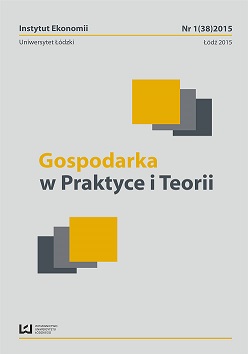Modifications to the scope of the term ‘ecological security’ in Poland using the example of water management
DOI:
https://doi.org/10.18778/1429-3730.38.05Keywords:
environmental security, water managementAbstract
The term ‘environmental security’ is variously defined in different fields of science and policy, and in addition it has gained social circulation and popularity in everyday use. The Polish Constitution of 1997 makes public authorities responsible for ensuring environmental security. However, no legal act contains a definition of this term, which on the one hand results in a strong constitutional grounding of the concept, and on the other hand leaves a certain range of freedom in interpreting the term in practice. The purpose of this article is to analyze the approaches and the changes in the area of environmental security in Poland, based on strategic documents. The analysis is based on examples from the area of water management, and is preceded by deeper theoretical considerations related to the scope and definition of the term ‘environmental security’.
References
Biała księga bezpieczeństwa narodowego Rzeczpospolitej Polskiej (2013), BBN, 2013.
Google Scholar
Ciechowicz-McLean J. (2001), Międzyanrodowe prawo ochrony Środowiska, Warszawa.
Google Scholar
Daase Ch. (1992), Ökologishe Sicherheit konzept oder Leerformer, [w:] B. Meyer Ch. Wellmann, “Umweltzerstörung. Kriegsfolge und Kriegsursache”, Frankfurt 1992, s. 33; za M. Pietraś (2000), Bezpieczeństwo ekologiczne w Europie. Studium politologiczne, Wydawnictwo: Uniwersytet Marii Curie-Skłodowskiej, Lublin.
Google Scholar
Deudney D. (1990), The Case Against Linking Environmental Degradation And National Security, ‘Millenium: Jurnal of International Studies’, vol. 19, s. 461; Pietraś M. (2000), Bezpieczeństwo ekologiczne w Europie. Studium politologiczne. Wydawnictwo: Uniwersytet Marii Curie- -Skłodowskiej, Lublin.
Google Scholar
Gover V.I. (2007), Water: A Source of Conflict or Cooperation?, Science Publishers, Enfield, NH, USA 2007.
Google Scholar
DOI: https://doi.org/10.1201/b10990
Haber J., (1981), Bezpieczeństwo jako determinanta stosunków międzynarodowych, [w:] M. Krauze (2011), Bezpieczeństwo ekologiczne w świetle postanowień Konwencji o zakazie broni Chemicznej, „Materiały wysokoenergetyczne, t. 3.
Google Scholar
Homer-Dixon Th (1991), Environmental Change and Human Security, Canadian Institiute of Forgein Afairs, Toronto 1991; za M. Pietraś (2000), Bezpieczeństwo ekologiczne w Europie. Studium politologiczne. Wydawnictwo: Uniwersytet Marii Curie-Skłodowskiej, Lublin.
Google Scholar
II Polityka ekologiczna państwa, RM, 2000.
Google Scholar
Kitler W. (2010), Bezpieczeństwo narodowe: Podstawowe kategorie, dylematy pojęciowe i próba systematyzacji, „Zeszyt Problemowy Towarzystwo Wiedzy Obronnej”, nr 1, s. 25.
Google Scholar
Konstytucja Rzeczypospolitej Polskiej z dnia 2 kwietnia 1997 r. DZ.U.1997 nr 78, poz. 483.
Google Scholar
Korzeniowski P. (2012) Bezpieczeństwo ekologiczne jako instytucja prawna ochrony środowiska, Wydawnictwo Uniwersytetu Łódzkiego, Łódź.
Google Scholar
Kozłowski S. (2005) Przyszłość ekorozwoju, Wydawnictwo KUL.
Google Scholar
Krajowym planie zarządzania kryzysowego (2012), RCB.
Google Scholar
Michajłow W. (1986), Problemy bezpieczeństwa ekologicznego na Kongresie Intelektualistów w Warszawie, „Nauka Polska” 1986 nr ½.
Google Scholar
Molvaer R.K (1992), Environmentally Induced Conflicts? A disscution Based on Studiem from the Horn of Africa, “Biulletin of Peas Propsals”. no 2.
Google Scholar
DOI: https://doi.org/10.1177/096701069102200204
Myers N. (1996), The environmentalDdimensions to Security Issues, “the Environmentalist”, nr 4, s. 251, za: Pietraś M. (2000), Bezpieczeństwo ekologiczne w Europie. Studium politologiczne, Wydawnictwo: Uniwersytet Marii Curie-Skłodowskiej, Lublin.
Google Scholar
Narodowy program ochrony infrastruktury krytycznej, RCB, 2013.
Google Scholar
Paczuński R. (2008), Ochrona środowiska, zarys wykładu, Oficyna Wydawnicza Branta, Bydgoszcz.
Google Scholar
Pietraś M. (2000), Bezpieczeństwo ekologiczne w Europie. Studium politologiczne, Wydawnictwo: Uniwersytet Marii Curie-Skłodowskiej, Lublin.
Google Scholar
Polityka ekologiczna państwa. MOŚZNiL, 1991.
Google Scholar
Poskrobko B., Poskrobko T. (2012), Zarządzanie środowiskiem w Polsce, Polskie Wydawnictwo Ekonomiczne, Warszawa.
Google Scholar
Program wodno-środowiskowy kraju, KZGW, 2010.
Google Scholar
Projekt Polityki wodnej państwa do roku 2030 z uwzględnieniem etapu 2016, KZGW 2010.
Google Scholar
Raczkowski K., Żukrowska K., Żuber M. (2013), Interdyscyplinarność nauk o bezpieczeństwie – paradygmat, wiedza, demarkacja, Difin, Warszawa.
Google Scholar
Renner M. (1989), National security: the Ekonomic nad Environmental Dimensions, Washington DC, s. 6, za Pietraś M. (2000), Bezpieczeństwo ekologiczne w Europie. Studium politologiczne, Wydawnictwo: Uniwersytet Marii Curie-Skłodowskiej, Lublin.
Google Scholar
Stosowanie intencyjnych technik przekształcania środowiska zostało zakazane konwencją z 1977 roku: Konwencja o zakazie używania technicznych środków oddziaływania na środowisko w celach militarnych lub jakichkolwiek innych celach wrogich. Przyjeta przez Polskę w 1978 r. Dz.U.78.31.132 – tekst pierwotny.
Google Scholar








